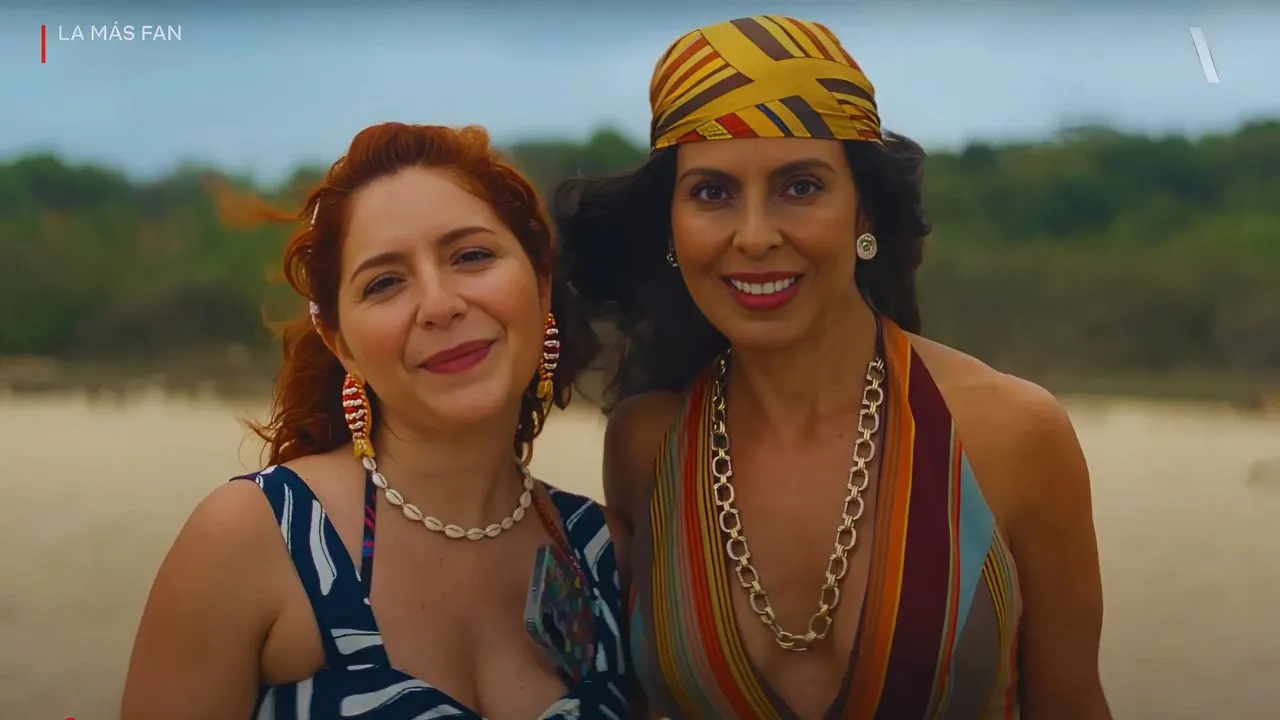There’s a fascinating, terrifying fragility to modern celebrity, a phenomenon that feels unique to our hyper-connected moment. An entire career, painstakingly built over years of work, can be publicly dismantled in a matter of hours by the swift, unforgiving judgment of the internet.
The new film The Biggest Fan taps directly into this contemporary anxiety, opening with its protagonist, Lana Cruz (Kate del Castillo), at the apex of her career. As the star of the long-running, successful television show Special Crimes, she is a household name, beloved and seemingly untouchable.
That sense of security evaporates in a single, chaotic moment. Following a grueling day on set, she is swarmed by fans. One supporter, overzealous and ignoring barriers, grabs her from behind. Startled, Lana instinctively swings her arm, and the resulting backhanded slap is captured on a dozen smartphones.
The video goes viral almost instantly. The crucial context—the breach of personal space, the reflexive nature of the action—is erased in the digital tide. A hashtag becomes her professional epitaph. Her show is unceremoniously dropped by the network, her reputation is left in ruins, and Lana is effectively, and totally, cancelled.
The film uses this potent premise to set up what could be a sharp modern parable about public image, the absence of nuance in online discourse, and a star’s sudden, dizzying fall from grace. It places its character at the very bottom of a deep hole and asks us to watch as she attempts to climb out.
From Scandal to Set Life
A year after her public immolation, Lana is a ghost of her former self. We find her unemployed, surrounded by junk food, and deeply estranged from her teenage daughter, Greta, for whom the scandal created its own social fallout.
The silence is broken when a lifeline appears, offered by her agent: a role in a quirky, low-budget arthouse film shooting in a remote Mexican village. It’s a world away from the slick studio productions she’s used to. The opportunity forces a difficult choice, as accepting the part means missing her daughter’s graduation—another painful sacrifice at the altar of her profession.
Upon her arrival in Mexico, the film-within-a-film’s production is immediately presented as its own peculiar brand of chaos. The director, Aristoteles, is a walking caricature of the sensitive, tortured auteur, a trope that feels more borrowed than inspired. The set is a world of hushed whispers and baffling directorial methods.
It is here, in this strange new environment, that Lana meets Polly (Diana Bovio), the effervescent cleaner of the villa where she’s staying. Polly is not just a cleaner; she is Lana’s most ardent supporter, a true believer who views the infamous slap as an unfortunate, forgivable mistake.
With breathtaking speed, Polly maneuvers her way into Lana’s life, first as a confidante and then as her self-appointed personal assistant and social media guru. She is convinced she can repair Lana’s public image, one Instagram post at a time. This unusual, almost immediate alliance adds another layer of unpredictability to Lana’s already surreal situation.
An Orbit Without a Center
A film can often survive a shaky script if its central performance gives the audience something to hold onto, an emotional anchor in a narrative storm. In The Biggest Fan, that anchor is unquestionably Diana Bovio as Polly.
She is the vibrant, beating heart of the movie, infusing a potentially one-note character with a desperate, complex, and at times deeply human energy. Bovio’s performance allows Polly to be more than a simple obsessive; she’s funny, caring, and her fierce loyalty to Lana feels entirely genuine, even when it manifests in disruptive and misguided ways. She is a bright spot of authenticity in a film that often struggles to find its footing.
The movie falters, however, with the very character we are meant to follow on this journey of redemption. The screenplay leaves Kate del Castillo’s Lana emotionally stranded. We are given hints of a deeper trauma, but she remains a surprisingly static figure.
A protagonist in a story like this needs a clear internal arc, but Lana’s is nearly flat. She begins the story as self-involved and, despite the professional turmoil that is meant to humble her, she ends it in much the same way.
This lack of transformation creates a vacuum at the story’s core, making it difficult to invest in her comeback. The profound underuse of her daughter, Greta—a character who could have provided a much-needed moral and emotional grounding—only serves to highlight this central emptiness.
A Script Full of Blank Pages
As someone who loves movies about making movies, I find the subject endlessly fascinating. The best examples, from The Player to Adaptation, peel back the curtain to reveal something true about the creative process or the fragile egos within it.
The Biggest Fan gestures toward big ideas—the toxicity of parasocial relationships, the transactional nature of celebrity, the path to redemption—but it never commits to a meaningful exploration of any of them. The narrative feels less like a structured story and more like a collection of disconnected comedic and dramatic scenes that never quite mesh.
Potentially powerful subplots, like the brief flashbacks to Lana’s childhood with a demanding stage mother, are introduced only to be completely abandoned, leaving any potential for psychological depth on the table.
The screenplay’s structure becomes particularly weak in the third act, where it resorts to predictable melodrama, including a “lost in the wilderness” sequence that feels like a lazy device to force a confrontation. This is a film that presents a genuinely relevant and compelling premise, but its execution is frustratingly shallow.
It squanders the electric, heartfelt performance from Bovio and a timely concept on a story that ultimately feels hollow, a cinematic journey that ends up right back where it started, having learned very little along the way.
The Biggest Fan (La Más Fan) is a 91‑minute Mexican comedy film that premiered globally on Netflix on May 1, 2025.
Full Credits
Director: Maria Torres
Writers: Maria Torres, Enrique Vázquez
Cast: Kate del Castillo, Diana Bovio, Hugo Catalán, Gabriel Nuncio, Ana González Bello, Dariana Delbouis, Ricardo Esquerra, Amaranta Ruiz, Emma Ramos
The Review
The Biggest Fan
While The Biggest Fan starts with a timely and fascinating premise about the perils of modern fame, it’s ultimately a film cancelled by its own shallow script. Diana Bovio delivers a wonderfully energetic performance as the dedicated fan, Polly, providing the movie with its only real heartbeat. Unfortunately, her efforts are wasted on a hollow story that refuses to explore its own themes, centered on a protagonist who remains stubbornly unlikable and unchanged. It’s a frustrating watch that squanders its immense potential, leaving you with nothing more than a few interesting questions and no satisfying answers.
PROS
- Diana Bovio gives a standout, heartfelt, and energetic performance that carries the film.
- The initial premise, which tackles cancel culture and the volatility of online fame, is highly relevant and compelling.
CONS
- An unfocused and messy script that fails to develop its most interesting ideas.
- The protagonist, Lana, is a static character with no meaningful growth, making it difficult to invest in her journey.
- The film relies on tired clichés and a predictable third act instead of offering fresh insight.
- Key subplots and themes are introduced and then quickly abandoned.


















































